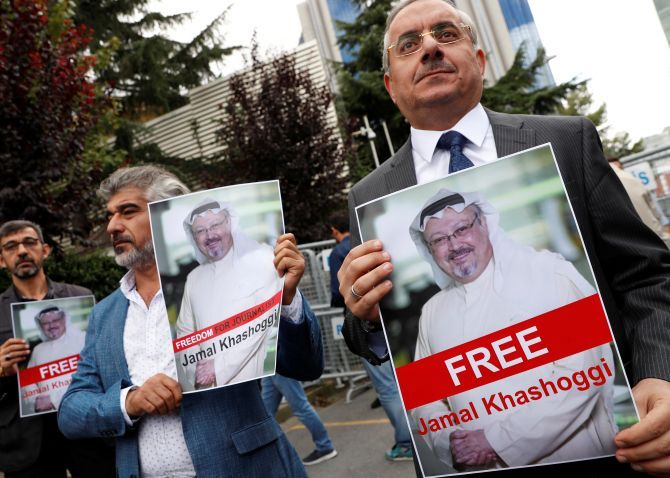'A 2018 murder may lead to shifts in the geopolitical order and impact at least one monarchy,' says Devangshu Datta.

On June 28, 1914, the heir to the Austro-Hungarian Empire, Archduke Franz Ferdinand, was assassinated in Sarajevo. The details of the incident are baroque. Sarajevo is the capital of Bosnia-Herzegovina, a former Turkish possession, which had been formally annexed by Austria in 1908. Many people in Serbia thought the map of the Balkans would look more aesthetic if Bosnia was part of Serbia instead.
Six members of a Serbian secret society, The Black Hand, were stationed along the VIP route to target the royal as he paraded around in an open car. One of them threw a grenade. The Archduke was unhurt but members of his entourage were injured. The man who had chucked the grenade swallowed a cyanide pill and jumped into the river. The pill didn't work and the river was less than a foot deep. So, he was fished out.
The death squad aborted its plans since the archduke cut short the parade. One conspirator, the 19-year-old Gavrilo Princip went to a cafe in a nearby alley to refresh himself with a cuppa. Meanwhile, the archduke wanted to visit the injured in hospital. His driver got lost and ended up in that alley.
As the car was reversing out of the alley, Princip walked up and shot the archduke and his wife Sophie. Then, he, too, tried to commit suicide. But his pill was also a fake. Interrogation suggested that Serbian intelligence, which ran The Black Hand, was involved in the plot.
Austria presented an ultimatum with many demands to Serbia. The Serbs asked Slavic big brother, Russia, for help. The Austrians formally declared war on July 28. Germany and Turkey were Austria's allies and committed to mobilisation once Austria was at war. The Russians were allied to the French and the British, who had similar treaty obligations.
The assassination was a catalyst triggering those contingency plans. About 40 million died in the war that followed. The Austro-Hungarian empire and the Turkish empire broke up and became rump republics; the Russian empire became a Communist State, and Germany too, ceased to be a monarchy.
A 2018 murder may lead to, admittedly less radical, shifts in the geopolitical order, and impact at least one monarchy.
Jamal Khashoggi's murder was not an 'assassination' by definition since he was not particularly famous. But the grotesque details of his butchery by a 15-member death squad have sparked revulsion in a way that thousands of deaths in Yemen had not.
It has, perhaps irrevocably, tarnished the Saudi crown prince's attempts to present himself as a liberal reformer.
Many businesspeople pulled out of the 'Davos in the Desert'. There is pressure on financial entities (such as SoftBank) to cease to accept money from the kingdom. Khashoggi had permanent US resident status and his children are Americans. The Trump administration is, therefore, under domestic pressure to be seen to do 'something' to punish a long-term ally.
This may have repercussions on both oil and financial markets. More broadly, it could reshape geopolitical alliances.
The rulers of Saudi Arabia have several levers. One is their ability to swing oil prices by pumping more, or less, oil. They can also influence the Organisation of the Petroleum Exporting Countries cartel's production.
There is the related ability to deploy vast sums in favoured projects. Beyond that, there is status as the guardian of Islam's holy places, and a steadfast opposition to a Shia alliance led by Iran.
If the pecking order in the kingdom changes as a result of this murder, it could change Saudi foreign policy.
US arms have supported Saudi efforts in the Yemen proxy war versus Iran. If America does 'punish' the Saudis, will the kingdom switch its arms-shopping to Russia? That would definitely change geopolitical relationships.
Will Saudi Arabia pump more oil to force prices down? That would hurt the US, since American oil extraction is high cost. Or, will it cut production to force prices up and thus, punish the oil-deficient liberals of the European Union?
There is an OPEC conference due in December. The decisions taken there would affect the global economy and, one way or another, those would be influenced by the death of a commoner.











